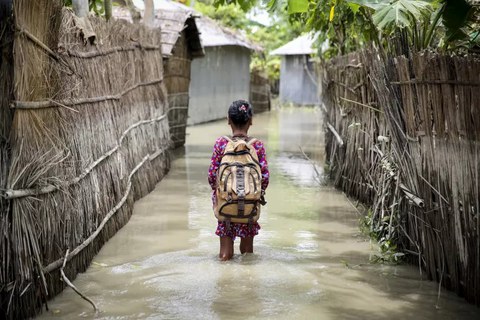13.11.2025
TUD stärkt den globalen Dialog zur Klimaanpassung: Positionspapier „Resilient by Design” hebt die Rolle der Hochschulbildung für die Widerstandsfähigkeit gegenüber Klima- und Wasserveränderungen hervor
Der United Nations University Hub on Climate Resilience and Sustainable Technologies (UNU Hub CREST) an der Technischen Universität Dresden (TUD) und das Global Water and Climate Adaptation Centre (ABCD-Centre) haben einen Policy Brief mit dem Titel „Resilient by Design – Integrating Water and Climate in Higher Education for a Sustainable Future” veröffentlicht. Die Veröffentlichung unterstreicht die entscheidende Rolle von Hochschulen bei der Überbrückung der Lücke zwischen Klimawissenschaft und Wasserpolitik. Die Veröffentlichung erfolgt zu einem entscheidenden Zeitpunkt, da sich die Staats- und Regierungschefs der Welt zur 30. UN-Klimakonferenz (COP30) in Belém, Brasilien (10.–21. November 2025) versammeln und die Dringlichkeit von Klimaanpassungsmaßnahmen betonen.
Mehrschichtige Anpassungsstrategie
Der Bericht „Resilient by Design” untersucht die miteinander verflochtenen Herausforderungen des Wassermanagements und des Klimawandels. Er skizziert eine mehrschichtige Anpassungsstrategie – von sofortigen Bewältigungsmaßnahmen bis hin zu langfristigen transformativen Veränderungen – und empfiehlt die Einbettung klimaresponsiver Wasserpolitiken in nationale und internationale Rahmenwerke. Der Bericht präsentiert eine Vision für sektorübergreifende Zusammenarbeit und zeigt auf, wie Hochschulen als Zentren für Innovation, Forschung und Kapazitätsaufbau dienen können, um eine nachhaltige Wasserbewirtschaftung und Klimaresilienz voranzutreiben. Im Wesentlichen werden Universitäten als „Wissensinfrastrukturen” positioniert, die dabei helfen, wissenschaftliche Erkenntnisse in praktische Lösungen und öffentliches Handeln umzusetzen.
Ein Kernthema von „Resilient by Design“ ist die Stärkung der Schnittstelle zwischen Wissenschaft und Politik im Bereich Klimaschutz. Die Autoren betonen, dass Forschungsergebnisse und technologische Innovationen die politischen Entscheidungsträger und die Gesellschaft effektiv erreichen müssen. Hochschulen können dies durch politische Dialoge, Schulungen und Öffentlichkeitsarbeit fördern und so sicherstellen, dass Entscheidungen zu Wasser und Klima auf den besten verfügbaren Erkenntnissen basieren. Durch solche Transferaktivitäten tragen Universitäten dazu bei, Erkenntnisse in Maßnahmen umzusetzen – beispielsweise durch die Beratung von Regierungen zu adaptiven Wasserinfrastrukturen oder die Aufklärung der Öffentlichkeit über Wasserschutz. Dieser Wissensaustausch ist entscheidend für die Umsetzung der Empfehlungen des Policy Briefs und die Erzielung realer Auswirkungen.
Maßnahmen für Universitäten, Regierungen und Gemeinden
Während die COP30 in Belém den Fokus auf Anpassung und Resilienz legt, bietet „Resilient by Design“ aktuelle Einblicke, wie die Wissenschaft diese Bemühungen unterstützen kann. Die Veröffentlichung des Policy Briefs soll internationale Diskussionen anregen und einen Entwurf für gemeinsame Maßnahmen bieten, die Universitäten, Regierungen und Gemeinden miteinander verbinden. Während die Verhandlungsführer der COP30 nach Möglichkeiten suchen, den Fortschritt der Anpassung zu messen und zu finanzieren, liefert der Policy Brief praktische Ideen zur Integration von Wassersicherheit und Bildung in die Klimaagenda. Seine Kernbotschaft ist optimistisch: Indem wir die Hochschulbildung als Motor des Wandels nutzen, können wir klimaresiliente Wassersysteme fördern, die die Grundlage für eine florierende, nachhaltige Zukunft bilden.
Der Policy Brief wurde unter der Schirmherrschaft des ABCD-Centre und des UNU Hub CREST entwickelt. Das ABCD-Centre – eine Zusammenarbeit zwischen der TUD, der RWTH Aachen, dem IIT Madras (Indien), dem AIT (Thailand) und der UNU-FLORES – konzentriert sich auf Wassersicherheit und Klimaanpassung im globalen Süden. Der 2025 in Dresden gegründete UNU Hub CREST verbindet das Fachwissen der TUD und der UNU-FLORES, um eine Brücke zwischen Technik und Politik für Klimalösungen zu schlagen. Prof. Dr.-Ing. Jürgen Stamm, Direktor des UNU Hub CREST, und Dr. André Lindner, stellvertretender Direktor, gehören zu den Mitverfassern des Berichts – was die führende Rolle der TUD bei der Förderung der Schnittstelle zwischen Wissenschaft und Politik im Bereich Klimaresilienz unterstreicht. Die Mission des Hubs ist es, Bildung, Forschung und Wissenstransfer zu nutzen, um Wissenschaft, Politik und Praxis miteinander zu verbinden. Dies spiegelt sich im gesamten Bericht wider.
Weitere Informationen:
Policy Brief: Resilient by Design - Integrating Water and Climate in Higher Education for a Sustainable Future
UNU Hub on Climate Resilience and Sustainable Technologies - CREST
ABCD-Centre
Kontakte:
Prof. Dr.-Ing. Jürgen Stamm
Tel.: +49 351 463-34397
E-Mail: Juergen.Stamm@tu-dresden.de
Dr. André Lindner
Tel.: +49 351 463-34899
E-Mail: andre.lindner@tu-dresden.de

